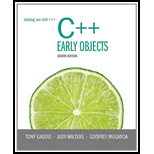Solutions for Starting Out with C++: Early Objects
Browse All Chapters of This Textbook
Book Details
Tony Gaddis's accessible, step-by-step presentation helps beginners understand the important details necessary to become skilled programmers at an introductory level. Gaddis motivates the study of both programming skills and the C++ programming language by presenting all the details needed to understand the "how" and the "why"-but never losing sight of the fact that most beginners struggle with this material. His approach is both gradual and highly accessible, ensuring that readers understand the logic behind developing high-quality programs.
In Starting Out with C++: Early Objects, Gaddis covers objects and classes early after functions and before arrays and pointers. As with all Gaddis texts, clear and easy-to-read code listings, concise and practical real-world examples, and an abundance of exercises appear in every chapter. This text is intended for either a one-semester accelerated introductory course or a traditional two-semester sequence covering C++ programming.
Sample Solutions for this Textbook
We offer sample solutions for Starting Out with C++: Early Objects homework problems. See examples below:
More Editions of This Book
Corresponding editions of this textbook are also available below:
